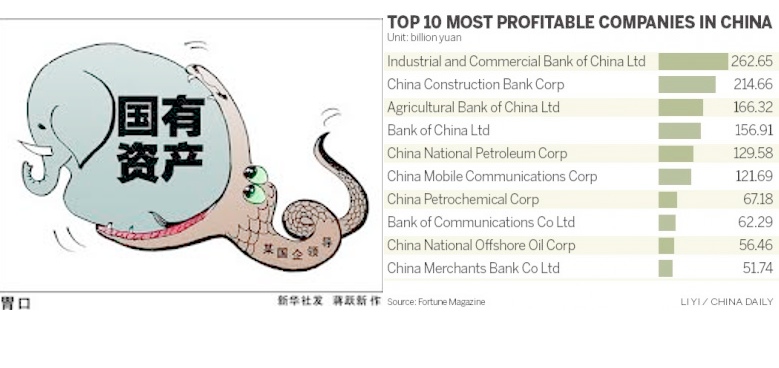
A cartoon on SOE corruption from China state-owned Xinhua News and China's top 10 profitable companies (All are SOEs).
An unprecedented campaign targeting suspected corruption among officials from the Chinese communist party, government, military and state-owned enterprises has been underway since Chinese President Xi Jinping came to power in late 2012. The list of “flies” (ordinary people) and “tigers” (top executives) snared in the trap is growing longer, but many wonder if the case-by-case crackdown will make a difference, given the system is designed for government officials and capitalists to work closely together.
To address the fundamental problem of corruption, Liu Shengjun, a well-know economist and an opinion leader on Chinese social media site Weibo, has audaciously called for the privatization of state-owned enterprises. He called them China's “crony capitalists”, as the sector is inefficient and breeding monopoly and corruption.
The economist further elaborated:
实践证明,国企既非社会主义的优越性,亦非执政基础,而是在破坏执政基础。假如能把国企私有化(以公开透明方式)则:出售国企收入填补养老金黑洞,财政何愁没钱?破除垄断、公平竞争,经济何愁不好、企业何愁不创新?话费油价下降,何愁消费不给力?腐败减少一半,何愁民众不满意?
It has proved that state-owned enterprises have neither represented the socialist advantages nor been the ruling foundation, but have harmed the ruling foundation. If China’s state-owned enterprises could be privatized in openness and transparency, why should the government worry about budget since the revenue could make up pension deficit? Why should government worry about the downturn and companies worry about not innovating since it would break monopoly and prompt fair competition? Why should we worry about consumption slumps since the phone bills and oil prices would fall? Why should government worry about the public complaints since corruption would decrease by half?
He also cited the words of a popular real estate entrepreneur and an opinion leader, Ren Zhiqiang, that “state-owned enterprises should be entirely abolished”.
【国企改革呼唤思想解放】1、吴敬琏:有人说因为有社会主义前缀,国企就改不成了,我说没这道理;2、胡祖六:有国企就不可能公平竞争;3、@任志强:我最重要的认识是,国企应彻底取消
State-owned enterprise reform calls for ideological emancipation: 1. Wu Jinglian (a prestigious economist): Some say state-owned enterprises by their socialist definition can’t be reformed, I say that’s unreasonable; 2. Fred Hu (former Goldman Sachs Asia – Pacific general manager): Fair competition could never exist as long as state-owned enterprises are there; 3. Ren Zhiqiang: state-owned enterprises should be entirely abolished, that’s my most important understanding.
Liu’s comments are in response to another corruption case recently embroiling China’s state-owned enterprises.
Deng Qilin, the former chairman of major steelmaker Wuhan Steel, is alleged to have committed serious “violations of discipline” (a euphemism for corruption), the Communist Party's Central Commission for Discipline Inspection (CCDI) said on its website on August 30.
Deng was reportedly autocratic and overbearing in management. His brother and son allegedly took advantage of the relationship to net illegal profits. Deng's decision to invest in mining abroad led to a huge loss.
Back in March, the former chairman of China’s largest automaker FAW, Xu Jianyi, was under investigation for “violating party discipline”, according to the CCDI. A month later, former top executive Shi Tao was sentenced to life in prison for accepting bribes.
Last year, Beijing unveiled a “mixed ownership” policy, which encourages private capital to invest and hold minority stake in state-owned enterprises. Yet, the policy generates little effect because minority stake excludes them from having decision-making power on business strategy and management, leaving the investors skeptical of the return on their investment.
There are thousands of state-owned enterprises in China, and they form the backbone of economic growth. Their monopolies in many fields shut out smaller market entities and lead to low efficiency and poor service.
However, privatization or abolishment of state-owned enterprises is still a taboo in China as the Chinese Communist Party is still ideologically committed to the socialist idea of “collective ownership”. Liu's outspoken call is timely in prompting the public to examine the nature of the country's corruption and seek a solution.







3 comments
Can someone translate the cartoon for me? Thanks